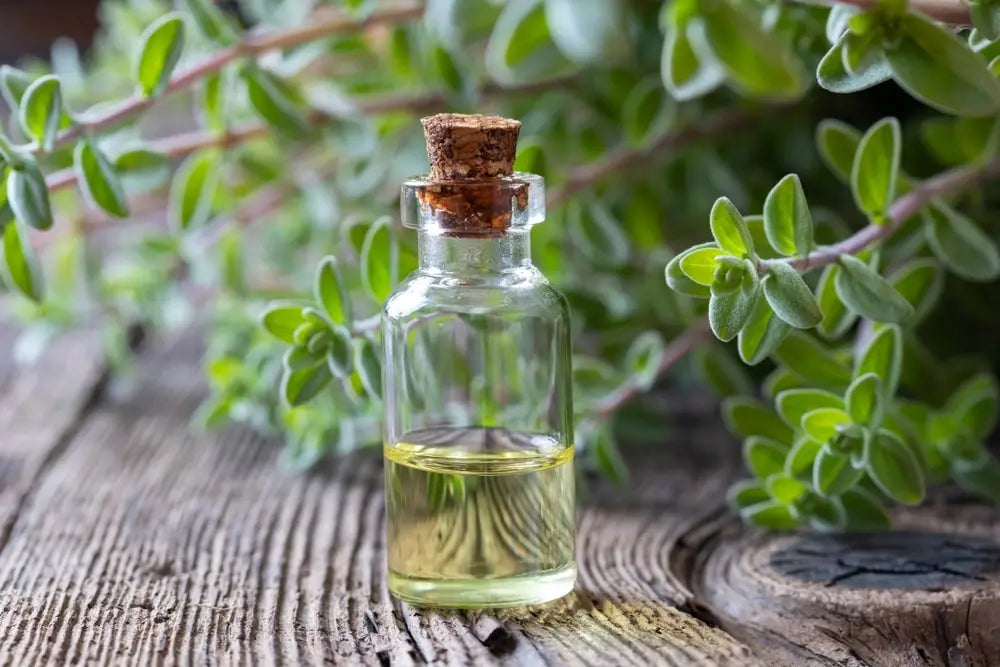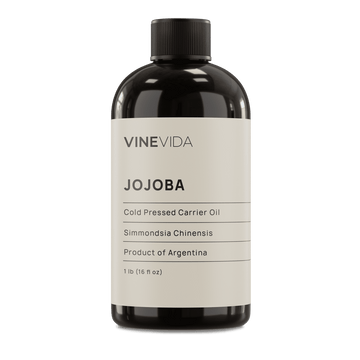Marjoram has been used for centuries in traditional medicines to reduce inflammation, improve digestion, and calm, relieving anxiety and tension. It has been held sacred in many religions, and more recently, scientific evidence has revealed the potent properties of Marjoram, particularly as an antioxidant and anti-diabetic agent. Today, we think of ways to use marjoram essential oil.
Where Does Marjoram Essential Oil Come From
Marjoram essential oil is steam-distilled from the marjoram plant, a member of the mint family characterized by dark green, ovate leaves and tiny white flowers that are particularly beloved by honeybees. It originates from parts of Europe, such as Spain, Italy, and Portugal. It thrives in warm temperatures and full sun but can tolerate some shade and cooler climates. Its leaves extract the essential oil, which is then steam distilled for about 20 mins. The result is an aromatic pale yellow essential oil with multiple health benefits.
What Does Marjoram Essential Oil Smell Like?
Marjoram essential oil has a warm and soothing herbal note, which combines well with other aromatics to create perfumes of strength and depth. It is generally used as a top, middle, or base note in blends, suggesting a medicinal aspect and sweetness. Marjoram is also known to be a recent addition to the perfumery world due to its calming and centering quality. Its fragrance adds complexity to florals and classically wintery scents, but it can also bring a pleasant earthiness complemented by barely sweet undertones. Depending on what soaps or balms it's used for, blending notes of Marjoram could include vetiver, lavender, or other herbs like parsley that carry its intensity in lighter concentrations.
Why Do So Many Articles Confuse Oregano and Marjoram Essential Oils?
Marjoram's Latin name is Origanum majorana. The herbs are closely related and even look alike in the garden. However, their chemistry is very different, so their properties are too.
Oregano oil is a spectacular antimicrobial, but a fierce and aggressive essential oil. Marjoram is a lot gentler and easier to use. Please do not interchange the oils.
Also Read: Marjoram vs Oregano Essential Oil: They Both Differ and Overlap
The Chemistry of Marjoram Essential Oil
It's primarily composed of alcohols like geraniol, linalool, and terpinene-4-ol, as well as monoterpenes such as borneol. This volatile oil also contains aldehydes, specifically formaldehyde and acetaldehyde, which give it the popular sweet yet slightly bitter taste. Additionally, the aroma of marjoram essential oil is attributed to the presence of sesquiterpene compounds like caryophyllene oxide and humulene. This ultra-complex chemical makeup gives this herbal oil a unique balance between sweet and spicy fragrances.
Timeless Lessons of Marjoram
Ancient Greece
We can trace the usage of marjoram plants back as far as the hills of Ancient Greece, where the plant was known as Joy of the Mountains, perhaps because of how hardy it is and how readily bees visit it to bring back pollen and make copious amounts of honey.
It is not surprising that it became such an important plant in the religious and social customs of the Mediterranean. Plants that attract bees often have religious significance with death because the ancients believed bees to be intermediaries of the gods, that they could bring messages back and forth from the dead, and indeed brought new souls in at birth and took away the old souls at death.
It was associated with the goddess of love and beauty in Greece, Aphrodite. The pretty little herb was known as Joy of the Mountains but was often planted on graves in the hope of a happy afterlife. It may be that the Aphrodite connection came from her eternal mourning of the death of her mortal love, Adonis, since it was customary for garlands of Marjoram and oregano to be worn at both funerals and weddings. In medieval times, it was expected to give a sprig of Marjoram to wear in the hope of banishing sadness.
Ancient Egypt
In ancient Egypt, the scent was seen as the manifestation of a deity. Marjoram was believed to invoke the crocodile god Sobek. The primordial creator god, born of a lotus flower, Sobek, was thought to represent strength and protection, with special powers to control the waters of the Nile, potentially the most crucial action for the nation's wealth that depended entirely on the inundation of the annual floods. His control over the waters connected him with fertility, rebirth, and resurrection ideas. Marjoram, then, they believed, possessed Sobek's magical powers and could give protection against evil spirits as well as fertility and strength. It was one of many herbs used by the Ancient Egyptians for medicinal purposes or to invoke spiritual or divine protection. It is helpful to remember this Sobek action and how Marjoram was then associated with water.
Herbal Uses For The Marjoram Plant
Marjoram was also used medicinally in ancient Egypt, treating ailments ranging from fever relief to reducing stress related to childbirth. Additionally, it had culinary uses and was often used as an ingredient for bread and oils.
Culpepper
In the Middle Ages, Culpeper described Marjoram as an excellent remedy for the brain and mind. He recommended drinking marjoram decoctions for diseases of the chest that hindered free breathing and advised using the herb to remove obstructions of the liver and spleen. (In Chinese medicine, the liver also rules anger and the spleen worry, giving us more clues to some of the benefits of Marjoram essential oil.
Planetary Rulership
He places Marjoram under the rulership of both Venus and Mercury. Venus, of course, is the Roman name for Aphrodite. In medical astrology, Venus rules the heart and the reproductive system. We can take that deeper: Venus rules over the metamorphosis of cells, how they reproduce, are enriched, and transformed. Venus rules the genito-urinary system, especially the bladder and kidneys. It governs harmony between the methods of the body. It is how the body is preserved. (How we look after our body and the antioxidant care of cells especially applies to Marjoram.)
Lastly, of course, as beauty, Venus rules over the quality of the skin and the complexion.
All of these pertain to ways you could use marjoram essential oil: the complexion, urinary bladder, kidneys, reproduction, and the harmony between all body systems.
Black marks of bruises can be removed by mixing dried Marjoram with honey, he says, when they are applied as a poultice. Marjoram oil eases stiff joints and sinews.
Interestingly, Culpepper recommends Marjoram (mixed with long pepper and acorns) to help patients who cannot urinate. (Wonder if that is Sobek and how he helps the waters? ) Isn't it fascinating how the mythological uses intersect?
As stated, Culpepper also places it under the rulership of Mercury, the planet of communication and thought processes. Mercury rules the nervous system and the mental faculties.
Culpepper describes how Marjoram can be used to treat loss of speech (whether that's through traumatic silence or a sore throat is unclear, but I would suggest both).
Other important Herbalists
The 12th-century abbess, Hildegard of Bingen, declared it a valuable herb for maintaining physical health generally, suggesting its use for treating gums and teeth and calming anxiety. She added to this by noting that if Marjoram is consumed, it helps against fatigue due to colds, fevers, or sleeplessness.
Nicolaus Copernicus agreed with Culpepper and Hildegard in general while adding their advice; he noted that Marjoram has drying humor, can treat stomach problems, and can aid digestion.
Sixteenth-century herbalist John Gerard recommended taking an infusion of Marjoram orally to ease problems caused by hot weather and commented that consumption of Marjoram may help one remain "merry."
Seventeenth-century botanist and physician James I, John Parkinson, also noted that Marjoram could improve appetite and digestion if taken at proper doses.
Amusingly, looking back at it with 21st-century eyes, John Parkinson also advised that boiling Marjoram in beer can "help execute a thorough purging of excess provender from oneself."
Provender? Waste products. We need to resurrect that word.
Two crucial early anonymous medieval herbals also speak of Marjoram. The Ex Herbis Femininis lists it as one of seven herbs believed to have substantial healing effects on women's issues, such as abdominal pain and fertility. Herbarius mentions its use for conditions like malnutrition.
Early Arabic Essential Oil Knowledge about Marjoram Essential Oil
Avicenna and Al-kindi, two scientists and writers whose works come from the medieval Islamic world, both discuss Marjoram. Avicenna, widely accepted as the father of distillation, refers to its analgesic and antispasmodic properties in his Canon of Medicine. At the same time, Al-kindi describes it as a coolant used to help reduce temperatures.
Also Read: Substitute for Marjoram Essential Oil: 10 Most Popular Alternatives
Ways to use Marjoram Essential Oil
Aching Muscles
Add a few drops of marjoram essential oil to a carrier oil and massage into aching muscles. It blends beautifully with soothing oils like lavender or chamomile, warming oils like black pepper and ginger, or ones that will further cleanse the joints like cypress or juniper.
Restless Nervous Days Or Melancholy
Add a few drops of marjoram essential oil to a diffuser or a bath to help you feel more centered and relaxed...
Colds and flu
A few drops of Marjoram essential oil in the bath are delicious if you have a cold or the flu. As Copernicus says, Marjoram is drying, so it is lovely for runny noses and is soothing and comforting.
Digestion
Add a drop or two of marjoram essential oil into a carrier to soothe gripey tummies, indigestion, or heartburn. It is beautiful for constipation or excess flatulence. Provender, the baby, sort it all out with Marjoram.
Headaches
Particularly stress headaches or ones where you feel a little gloomy. Combine with a drop of lavender or chamomile to bring joy back to the mountains - I think all Sound of Music, do you?
Insomnia
Marjoram generally has a powerful effect on the nervous system, particularly circadian rhythms and the body clock. Add a few drops of marjoram essential oil to a diffuser or a bath to help promote sleep.
Gynecological Balance
Adding a few drops of Marjoram essential oil into a massage oil or your bath can be incredibly soothing for menstrual cramps. Again, lavender can be a great support here, and geranium or clary sage blend nicely with Marjoram essential oil.
Indeed, a Chinese study done in 2012 showed that women who used a blend of lavender, Marjoram, and clary sage for a month found their pain score was halved the following month. (Ou, 2012)
Another great one for painful periods is ylang-ylang, which smells rather odd when mixed with Marjoram.
Again, folk medicine suggests that Marjoram essential oil could regulate scanty periods.
Many breastfeeding moms also swear by marjoram tea to promote breast milk production in nursing mothers, so breast massage with a weak concentration of essential oil may also be helpful.
Again, marjoram tea is well-recommended for polycystic ovarian syndrome, or PCOS, which was backed up by scientific evidence in 2015 (Haj-Hussain). While herbal proofs do not always translate into essential oil usage because not all constituents pass through distillation into the essential oil, this would undoubtedly be an area I would be tempted to try marjoram essential oil, since the tea reduces the levels of adrenal androgens in PCOS sufferers.
Respiratory Support
Add a few drops of marjoram essential oil to a diffuser or add it to a bath to help relieve respiratory problems.
Skin Radiance
Marjoram's drying nature makes it an excellent addition to toners and cleansers for greasy skin or adding moisturizers for acne.
Stress
Add a few drops of marjoram essential oil to a diffuser or a bath.
Safety for Marjoram Essential Oil
Marjoram is a lovely, safe, and easy oil to use. Safe after 16 weeks of pregnancy.
The maximum dilution for Marjoram is 3%.
Conclusion
Marjoram essential oil is comforting and cozy. Beautifully uplifting on mad, harmful, or sad days, it is also great for gynecological support, digestive help, and sleep.















